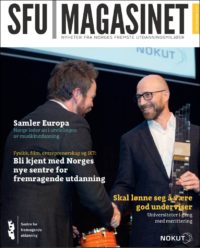Redesigning the bachelor’s degree in biology at UiB
At BIO we are now in the process of redesigning our bachelor programme in biology. This is done through the DIKU-founded project “Student active learning in the (re)design of the biology education”, which is a collaboration between bioCEED, BIO and the UiB Learning lab. An important tool for this work is the redesign model developed by Texas A&M which now is being adapted to the Norwegian higher education context, and as importantly, to our local context at the Department of biological sciences at the University of Bergen.
A core team has been established, consisting of faculty, students and administration, and background information has been gathered. Further, a two-day student workshop was held in October 2019, revolving around the theme question “how do we create the best biology education for the future”. The same question was used in a similar manner for the teachers’ retreat in 2019, where students also joined the discussion. We are now in the process of reformulating the intended learning outcomes (ILOs) for the bachelor’s degree in biology (Fig. 1). For that purpose, the principle of “backwards planning» is used, involving the specification of ILOs for the whole degree. There will be added more specific contents to the level of semester and individual courses at a later stage.

Figure 1. The process of formulating new intended learning outcomes (ILOs) for the bachelor’s degree in biology at UiB involves a consultation of faculty and students. The resulting inputs are the basis for the revision of the draft. (Illustration by Christian Bianchi Strømme)
The ILOs for the bachelor programme in biology stipulate what students are supposed to learn when obtaining the degree. Through this functionality, the document can be viewed as an agreement between the department and the students enrolled in the programme in terms of the knowledge and skills that must be covered. In line with the principle of backwards planning, the ILOs at programme level determine the contents of course-level ILOs. Therefore, any modifications of the ILOs on programme level will have consequences for the complexity of courses that the students go through in their undergraduate education, including specific course contents.
Involving course teachers in the redesign process not only allows for a better understanding what is presently being taught and how, but is also essential for sharing and further developing teaching practice at the programme and departmental levels. Therefore, the draft for programme level ILOs has been presented to the disciplinary groups (faggrupper). In addition, student representatives have been consulted in a workshop held by the bioCEED student co-workers. The draft has been commented upon both in general and specific terms during the respective meetings and as written feedback, and these inputs from faculty and students will guide the ongoing revision.
The involvement of faculty members in the discussion revealed an extensive willingness to contribute in the process. Further, the comments and suggestions from the different groups complemented each other in terms of the aspects and levels of the ILO draft that were addressed. Building on this successful involvement, faculty will again be consulted at the teachers’ retreat in January where more specific ILOs for the study programme semesters and courses will be derived based on the revised programme ILOs. More specifically, this will also involve considering what kind of learning activities are best suited for attaining these learning outcomes.
We would like to take this opportunity to forward a big thank you to all who have contributed to the discussions of the new ILOs for the bachelor’s degree in biology. In addition, we look very much forward to proceeding along the redesign process in collaboration with our colleagues and students.



